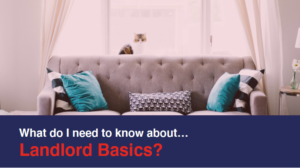LANDLORD BASICS

Do I need permission to rent out my property?
This is probably the first thing to check off your list – find out whether you are actually able to rent your property out to tenants. If you already own the property, it is likely that you will need to move your mortgage (if you have one) to a buy to let product. This could cost you more and involve redemption fees.
What do I need to know about licensing?
Some landlords will need to be licensed with the local authority before letting a house out. This usually applies if you are letting a house in multiple occupations, however, it also applies to other rented homes in some areas.
It is wise to always check with your council before going too far with the process!
Do I need an EPC?
Yes, an EPC is an essential part of marketing your property for sale or rent – it is a legal requirement that anybody in the UK will need.
The EPC must show a minimum rating of and E before the property can be rented out and the EPC is valid for 10 years.
Be sure to give a copy of the certificate to the tenants at the move-in stage.
How do I know if I have all the relevant safety requirements in place?
You must ensure that the property is fit to live in throughout the tenancy and this begins with making sure the property is safe for your tenants and compliant with the law before tenancy commencement.
There are a few specific things you will need to look at including:
- Gas Safety
The regulations require landlords to make sure that the gas supply and all gas appliances in the property are safe. They should be fitted, repaired and checked every year by a Gas Safe engineer. This applies to gas pipework, cookers, boilers, fires and water heaters.
- Electric Safety
The regulations require you to make sure that all wiring, plug sockets and any appliances you have provided are safe. You should organise an inspection by a qualified electrician before your tenants move in, followed by regular basic safety checks.
Checked appliances should have a PAT test sticker on the plug – this must show the date tested and when the next inspection is due to be carried out.
- Fire Safety & Furniture
Under the furniture and furnishings regulations 1988, you must make sure that any furniture you provide is fire resistant. Landlords can be fined and receive a prison sentence if they don’t follow fire safety regulations.
- Smoke & Carbon Monoxide Alarms
There should be working smoke alarms on each floor and carbon monoxide detectors in any room heated by solid fuel.
Where will I find information on the rental process?
It is a good idea to get yourself familiar with the governments How To Rent Guide (https://www.gov.uk/government/publications/how-to-rent), this is for landlords and tenants in the rental sector to help them with their rights and responsibilities. A copy of this guide must be provided to the tenant before they move into your property too. Failure to do this may result in issues if you ever have to take legal action against the failure of rental payments or similar issues.
Do I need to market my property in any particular places?
You may choose to use a letting agent to find tenants or you may choose to go it alone by advertising on local forums and sites – either way, make sure your advertising is well written and sells the house. You should include information such as facilities, location, transport information and anything which you feel is special about the property/area.
Make sure you take photos in a good light and that the property is clean – this will maximise the advertising!
Make sure the property is decorated and cleaned to a good standard and replace any tired carpets/flooring – this is essential to ensure you are able to ask for your tenants to hand it back in the same condition.
Do I pay tax on my rental income?
The rent you receive must be declared on an end of the year tax return. If you are in employment and taxed by PAYE you will be to register for self-assessment by 5th October the year after you start to receive income.
As a landlord, you will only pay tax on the profit you make after allowable expenses. Allowable expenses include building and contents insurance, repairs and maintenance (but not improvement), interest on property loans and utility bills.
There is also sometimes the option to claim tax relief on the replacement of domestic items such as beds, sofas and white goods. You will need to discuss this with your tax office or accountant.
Do I need to reference my tenants?
Yes! You must always obtain references from any potential tenants. These should include previous landlord references as well as their employer. Asking for copies of bank statements and proof of income is more than acceptable too and wherever possible a credit check is a useful thing to have for tenants also.
Do I need a tenancy agreement?
It is never recommended to have a tenancy without an agreement. This should be signed by you (or your managing agent) and each of your tenants.
The tenancy agreement should include:
- The names of all people involved
- The rental price and how it is to be paid
- Information on how and when the rent will be received
- The deposit amount and how/where it will be protected
- Details of when the deposit can be withheld
- The property address
- The start and end date of the tenancy
- Any obligations for both parties
- Any bills the tenant is responsible for
- How (if at all) the tenancy can be ended early
- Who is responsible for repairs (other than the ones the landlord is already legally responsible for)
- Whether the property can be sublet
Will I need landlord insurance?
As with any property, you must have buildings insurance, your tenants will pay contents insurance but if you have left any items in the property it may be worth ensuring those too.
You may also consider other forms of landlord insurance such as rent guarantee insurance to cover you for void periods or none payment of rent – this can sometimes be included in landlord policies but is sometimes a separate policy – make sure you check!
How/Where do I protect my tenant’s deposit?
Landlords are legally obliged to protect their tenant’s deposit and it must be held in one of the following schemes:
- The Deposit Protection Service
- My Deposits
- The Tenancy Deposit Scheme
You can decide which you prefer, but you must register your deposit within 30 days of it being received.
The Tenant Fees Act which came into force on 1st June 2020 limits security deposits to the maximum figure of 5 weeks rent.
Will I need an inventory?
Many disputes are around the damage of the property and its fixtures and fittings. Having a full inventory will help you avoid this issue. The inventory should include photos or videos of your property and any items included within the let. Your tenants should sign the inventory to confirm they agree to everything stated.
Interested?

